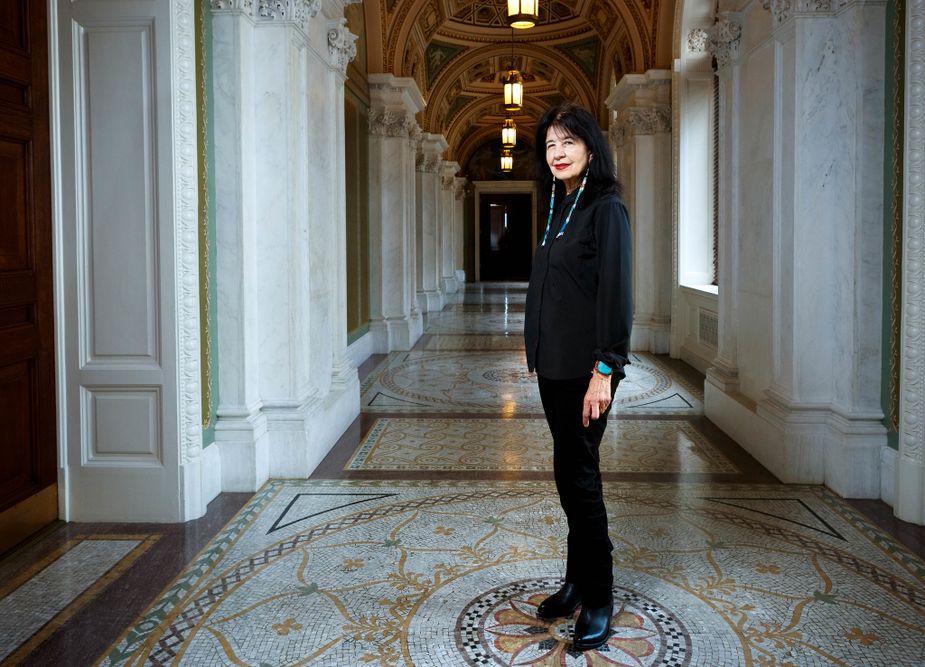America's Poet Laureate is Tulsa native Joy Harjo
Published June 2019
By Maura McDermott | 6 min read
The Library of Congress named Oklahoma native Joy Harjo the nation’s 23rd Poet Laureate Consultant in Poetry for 2019-2020. This story about Harjo was originally published in the September-October 1993 of Oklahoma Today magazine.

Joy Harjo, Tulsa native and member of the Muscogee Creek Nation, is America's 23rd Poet Laureate. Photo by Shawn Miller/Library of Congress.
As a kid, Joy Harjo was shy. Extremely shy. "I didn't talk," she recalls. But that was in another life, it seems, because today the tall, forty-two-year-old grandmother with the husky voice and hair as glossy as crow feathers is having no trouble telling a reading class at Muskogee High School how she came to be, of all things, a poet. Harjo is visiting as part of a program to encourage children to read. When she was in high school in Tulsa, she tells the students, she thought "poets were old white men in long trench coats (who lived) Back East," certainly not Creeks like herself from rural Oklahoma.
Poetry, in fact, was the last thing on her mind growing up in an alcoholic home where she often felt terrified, she tells her audience. Saved by an ability to draw well, she escaped to an Indian arts high school in Santa Fe and then the University of New Mexico. Hearing the Acoma poet Simon Ortiz read on campus in 1971—“It was the first time I had heard an Indian writer”—inspired her to change her major from painting to poetry. It was a gutsy move for a twenty-two-year-old with two young children; friends warned her she would starve. Poetry, however, gave the woman who never talked a voice. Poetry, Joy Harjo says, made her proud of who she was.
Since then Harjo has published five books and has come as close to poetry stardom as one gets (save reading at the presidential inauguration). She has won not one but two $20,000 National Endowment for the Arts creative writing fellowships; she was featured on Bill Moyers’ Power of the Word series on PBS a few years ago; and her latest book, In Mad Love and War, won the top award from the Poetry Society of America in 1990 and was praised in Ms. magazine. Among poetry books, hers are best sellers.
Her poems are full of dreams and visions and animals—horses, deer, eagles—which carry messages from the spiritual realm (“the place we all yearn for”) to the inhabitants of this world. Harjo's is a poetry of healing, of people learning to forgive and accept each other. Poetry, she believes, is a kind of sacred language. The need for it is “like the need to hear your heartbeat.”
Harjo’s father (now deceased) was Creek, and her mother, Cherokee and French. Her father’s people are from around Okmulgee, north of Henryetta, and she comes back often to visit relatives. Presently she teaches creative writing and Native American literature at the University of New Mexico and sits on the board of directors for the Native American Broadcasting Consortium. Her latest projects: a children's book, The Goodluck Cat, with the publishing house Harcourt Brace & Jovanovitch; a screenplay, When We Used to Be Humans, with the American Film Foundation; an anthology of Native women's writing, Reinventing the Enemy’s Language, with the University of Arizona Press; and an all-Native band called Poetic Justice in which she plays sax.
“You're never too old to start something,” Harjo assures the Muskogee high schoolers. Case in point: Joy Harjo taught herself to play the saxophone while in her thirties. Now it forms a backdrop for her poetry; poetry being, after all, says Harjo, “the heartbeat of the people.”

White-tailed eagle. Image by cocoparisienne
Eagle Poem
By Joy Harjo
To pray you open your whole self
To sky, to earth, to sun, to moon
To one whole voice that is you.
And know there is more
That you can't see, can't hear,
Can't know except in moments
Steadily growing, and in languages
That aren't always sound but other
Circles of motion.
Like eagle that Sunday morning
Over Salt River. Circles in blue sky
In wind, swept our hearts clean
With sacred wings.
We see you, see ourselves and know
That we must take the utmost care
And kindness in all things.
Breathe in, knowing we are made of
All this, and breathe, knowing
We are truly blessed because we
Were born, and die soon within a
True circle of motion,
Like eagle rounding out the morning
Inside us.
We pray that it will be done
In beauty.
In beauty.






